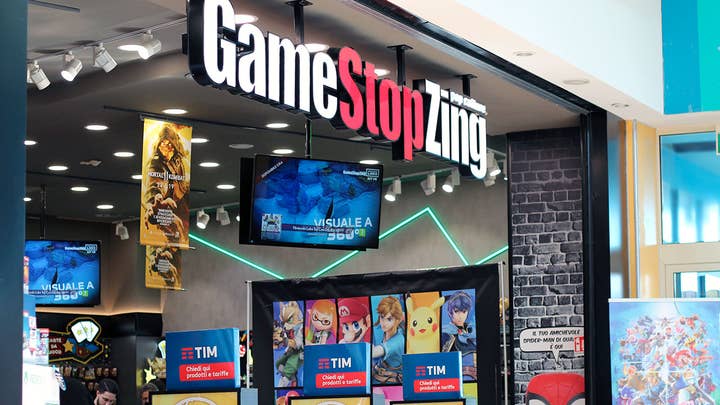It took a pandemic to improve acceptance of video games in Italy
Marco Saletta, chair of trade body IIDEA, tells us more about how the market has changed over the past year
Like so many markets, Italy saw record levels of spending on video games last year -- over €2 billion, in fact. But the financial uplift is not the turning point local companies are most excited about.
It's not even the sheer number of Italians playing either -- in fact, there has been a slight dip on the 17 million recorded in 2019. But Marco Saletta -- chair of local games trade body IIDEA -- notes that this is relatively stable when compared to the past few years, and reiterates that the 16.7 million people who play video games regularly accounts for 38% of the country's population between the ages of six and 64.

The big change is how much those people are playing.
The average time spent on video games per week is eight hours per person, and this rose to eight and a half during the first lockdown last year. Saletta emphasises that not only is this more than an hour a day, it's also "a level of engagement we have never seen in Italy before."
Naturally, the pandemic has been a crucial factor behind this. From March 9 to May 3 last year, the country was in its strictest lockdown, with Saletta describing it as almost like a "state of war." All but the most essential shops were closed, and people were urged to work from home.
Everything opened up in May, with restrictions on certain social activities like visiting pubs, but "nothing that impacted the games industry." That was until October, when the government introduced a new system under which each of Italy's 21 regions would impose different restrictions depending on the severity of the infection rate and other factors -- although this has now started to ease.
Inevitably, restricting people to their own homes led to increased usage of video games, but a consumer survey conducted by GameTrack indicates a changing attitude towards the medium.
"Video games gave people the opportunity to connect with each other," says Saletta. "They could de-stress themselves and enjoyed them a bit more when connected online -- which is a new way of perceiving [games] for Italian consumers."
"It's an enormous step forward culturally in the way video games are perceived"
He goes on to say the perception of video games and their audience in Italy has historically been that of teenagers, "nerds" and introverts who prefer to stay indoors than be outside -- a stereotype that Saletta admits the local industry has struggled to dispel.
"But this year, it's the consumers that are telling us that's no longer the case," he says. "So for us, that's a big win, a new way of perceiving video games that has never happened in Italy before.
"Whether this is a [permanent] change or if it's just temporary, we will see. But the perception is now that video games are a technological and entertainment tool that lets you socialise more and stay connected with others."
Saletta adds that the most important element of this shift has been that more parents have finally started playing games with their children, with multiplayer becoming a family activity in lieu of outdoor ones.
"That's an enormous step forward culturally in the way video games are perceived," he says. "And, of course, if you have kids, this year you had to challenge yourself to get to know video games because demand from kids was huge.
"Also, those who are already engaged with video games have been telling people, 'Hey, this is a way to engage with your kids, it's not just about leaving them alone and letting video games be a babysitter.' It's a very new perception."

As we've discussed before on both GamesIndustry.biz and our podcast, the global games business now faces the challenge of retaining those who have dedicated more time over the past year to playing video games. Saletta recognises this will certainly be a hurdle for the Italian market to overcome, predicting engagement to decline as restrictions begin to lift.
"For us, this is kind of a 'zero year' for how we measure market performance in the years to come"
"As I said before, Italy is not a native video games cultural country. We expect once people are allowed to go out -- especially with the weather we get here in Italy from April until the end of October -- people will experience more of an outdoor lifestyle than an indoor one. We expect some kind of drop in the figures we have seen this year.
"What we hope is that the cultural change, the position of video games in Italy now, will last in future years."
Another potential driver for engagement would have been the launch of the next-generation consoles, but supply constraints have limited the impact of both devices. IIDEA's annual market report revealed Xbox Series X|S and PlayStation 5 have sold around 500,000 units, with both selling out their launch stock immediately. Even now, new stock flies off the shelf as soon as it arrives -- a familiar story in most markets around the world.
And, despite the growth shown by Nintendo Switch, the decline in sales of PS4 and Xbox One meant the overall hardware market declined year-on-year -- but Saletta remains confident this could pick up in future.
"The figures we see in the reports... It's impossible to say how much higher they would have been," he says. "The demand for consoles is very high."
Another factor in this decline, as well as the drop in physical games sold, is the impact of the pandemic on retail, with most being closed for much of the past year. All stores were shut during the first lockdown, but then the government introduced new rules that allowed electronics outlets to reopen -- in part, to allow Italians to kit themselves out with laptops, computers and other hardware required for working at home.
However, specialist chains such as video games retailers remained closed. Saletta adds: "In Italy, GameStop still accounts for between 20% and 25% of the total market revenue and they were asked to stay closed until May, and then they shut down again around October."
Thankfully, this was offset by digital marketplaces -- hence the record spending on software last year. And the fact that people could still purchase IT hardware has had some benefits: some devices can be used to play games, and remote working means people ensured they had an internet connection, which opened up the opportunity to play games online.
"If you have kids, this year you had to challenge yourself to get to know video games because the demand from kids was huge"
Obviously, 2020 was something of an anomalous year and one that makes analysing Italy's games market more difficult going forward. Saletta says: "It's a difficult year to measure against consumer habits. 2021 will be more of a measure of how those habits are changing and how video games retailers can counterattack against what happened in 2020."
And what of making games? Last year, we spoke to several Italian developers and publishers about the shift to remote working, with Italy being one of the first Western markets that had to take such measures. At the time, there were concerns around delays and efficiency, and given the measures in place since October, Saletta reports that not much has changed.
"I had a chat with Milestone [Italy's biggest developer] the other day, and they said out of 150 people they employ, only 10 to 20 are daily working in the office," he says. "This working model is [affecting] companies' build style and way of working, and some are experiencing delays in being able to deliver their products. Of course, everyone is finding new ways of working but we are still suffering from this."
As mentioned, Italy enjoyed a record year when it comes to games spending -- as did so many markets, like the US, the UK and France. But can such a year be surpassed without the need for lockdown restrictions, trapping people at home with their games devices?
"It's difficult to say," Saletta concludes. "The pandemic did impact the engagement rate, but it also impacted the product availability. If we hadn't been in a pandemic for a year with a next-gen launch, maybe that would have boosted hardware sales, and software as a side effect.
"For us, this is kind of a 'zero year' for how we measure market performance in the years to come. I don't think the engagement rates we've seen are going to be very easy to repeat, but it depends very much on new releases, hardware availability, online features -- content is still king for driving revenues and engagement, so as long as we have some good content in 2021, I don't think the market will shrink as much as you might expect."

